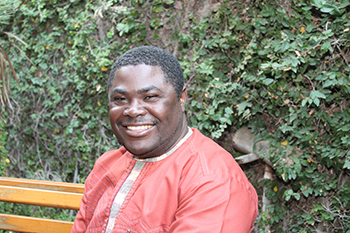Latest News Archive
Please select Category, Year, and then Month to display items
12 January 2024
|
Story Nonsindiswe Qwabe
|
Photo Sonia Small
 Since joining the UFS in 2008, Dr Grey Magaiza has worked extensively on approaches that can foster the socio-economic transformation of societies.
Since joining the UFS in 2008, Dr Grey Magaiza has worked extensively on approaches that can foster the socio-economic transformation of societies.
“The future should be one where communities can decide on their development agenda and futures. That’s the most important for me.” Dr Grey Magaiza, Deputy Director of the Centre for Gender and Africa Studies (CGAS) and Head of the Community Development programme on the Qwaqwa Campus, is passionate about capacitating communities to be agents of change and advancement. His vision for the future emphasises the empowerment of communities to take charge of their development by actively participating in decision making and the implementation of development projects that can improve their lives.
Since joining the UFS in 2008, Dr Magaiza has worked extensively on approaches that can foster the socio-economic transformation of societies. Over the years, he has crafted his research speciality into one that he is most proud of – being an interdisciplinary scientist immersed in the development of communities.
“I’m in a fortunate position of researching what I like. I say ‘fortunate’, because I’ve taken the time to understand what I’m passionate about, which is the overall field of rural livelihoods and livelihood futures – in short, community development. My research starts from an engaged university, understanding the elements that a university must use to enhance transformation and relevance to its immediate community in terms of development.”
One of the ways he has done this is by looking at social entrepreneurship as a development approach for young people in a rural setting. Through workshops with non-profit and civic organisations in Qwaqwa, Dr Magaiza has been helping these organisations to map out their needs and actively meet them through the involvement and support of external role players.
“We understand that communities are part of the national development agenda, but even that national agenda respects community knowledge and intentions and allows communities to shape their identity. A critical enabler of this is community organising. You bring back the capacity in communities to have dialogues on issues affecting them as spaces for engagement, knowledge exchange, and for people to just talk about their way forward.”
By enabling communities to define their development agenda, they can address their specific needs, challenges, and aspirations, he said. “When I look at livelihood futures, it’s quite an exciting aspect of my work – it’s like looking into a fortune tellers’ globe, because you’re not deciding for communities what they should do, but the communities themselves take those decisions.”
UFS mathematician rates as top reviewer
2017-09-27

Prof Abdon Atangana is a professor at the
Institute for Groundwater Studies at the University
of the Free State.
Photo: Rulanzen Martin
South Africa was included in the top 30 countries in terms of researchers who added the most pre-publication peer reviews.
Prof Abdon Atangana, a professor of Applied Mathematics at the Institute for Groundwater Studies at the University of the Free State (UFS), is included in the list of top reviewers from top countries, as determined by the number of verified pre-publication peer reviews added to Publons for Publons Peer Review Awards 2017.
Producing the most verified peer reviews
He rated in the top 1% of reviewers (9th), in all fields, who performed the most verified pre-publication peer reviews at Publons for Publons Peer Review Awards 2017. In 2017 he also received the following awards:
- Top reviewers for UFS in the category Mathematics, rating in eighth place. In this category Stanford University rated second. Rating in ninth place is the University of Luxembourg.
- Top reviewers for Mathematics (rating 1st). In this category the Southern Illinois University and the Johns Hopkins University in the US rated in 27th and 25th place respectively.
- Top reviewers for Engineering (rating 47th)
Prof Atangana’s research interests are methods and applications of partial and ordinary differential equations, fractional differential equations, perturbation methods, asymptotic methods, iterative methods, and groundwater modelling.
Passion for the development of science
Key to his success as peer reviewer is his passion for the development of science, his ability to write fair reports about a given manuscript, as well as his knowledge of what has been done and what the challenges are in a given field to be able to give a report that will help the advancement of science.
“Due to the impact of my research papers in the field of mathematics and applied mathematics and also my international recognition in the field of applied mathematics, many editors in more than 100 journals of applied mathematics trust my opinion to assess whether a submitted paper in a given journal of mathematics and applied mathematics can be published or not,” said Prof Atangana.